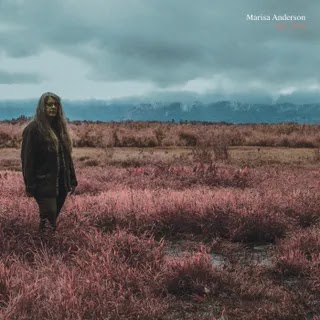On an alternately deliberate and exploratory new record, the guitarist and composer finds flashes of beauty at the heart of each instrumental tale.
There are, broadly speaking, two types of pieces on Still, Here, Marisa Anderson’s latest album of guitar instrumentals. One half of the album consists of traditional songs, so to speak, though they have no words. The likes of “Waking” and “The Crack Where the Light Gets In” are compact and deliberate, with clear trajectories of melody and form. Some are uplifting, others melancholy; their commonality lies not in any one emotional tenor but in the feeling of purposeful motion. The other pieces are more like exploratory missions, not motivated by the promise of a destination, but instead by the impulse to simply see and hear what’s out there. They are evocative rather than declamatory; setting scenes rather than plotting courses. Listening to “The Low Country” or “Night Air,” you get the sense of Anderson working out her ideas as she records them, trying out phrases and then refining them or putting them aside.
As on past releases, Anderson makes use of a wide array of styles, and of instruments with which to execute them: layering electric, acoustic, and pedal steel guitars; mixing steel strings and nylon; and augmenting several pieces with piano and electronic keyboards. Her fingerpicking is alternately reminiscent of Piedmont blues and Spanish flamenco. “In Dark Water,” the transfixing opener, has gradually expanding and contracting arpeggios that recall the early music of Philip Glass, and occasional interjections of rawboned slide guitar that sound more like Mississippi Fred McDowell. Though the album’s prevailing influences are from folk and classical music, “The Crack Where the Light Gets In” makes room for the sun-drenched hooks of 1960s California pop. Each track has its own sonic identity, but the album isn’t a smorgasbord, in large part due to Anderson’s distinct tone as a player, which shines through no matter the instrument or setting. She articulates each note with delicate command, knowing when to dig in and when to back off, never applying more force than she needs. Even the simplest chords, in her hands, carry a mysterious glow.
Anderson is also a gifted composer, equally adept with the thorny intricacy of “In Dark Water” and the spacious tunefulness of “The Crack Where the Light Gets In.” This makes the balance and sequencing of Still, Here’s deliberate and exploratory modes faintly puzzling. Why, after the masterfully shaped opening number, do we get three consecutive tracks that come across like solitary jam sessions? “The Fire This Time,” “The Low Country,” and “Night Air” all share the same essential arrangement conceit, with one guitar outlining two or three chords in ostinato while another couple of overdubbed instruments trade unresolved fragments of melody atop. All three pieces are somber and meditative; their open-ended approach, at its best, edges toward something ineffable, a grief too big to be named. Taking them in all at once, so near to the top of the album, can be tough going. Anderson finds flashes of beauty even when she seems to be casting about for something to say; were she a less graceful guitarist, this stretch might derail Still, Here’s momentum entirely.
The album finds its form again with the elliptical “Waking” and the exuberant “The Crack Where the Light Gets In,” which even in their titles convey the sense of emergence from a long darkness. After that warm respite, it closes with Anderson’s instrumental arrangements of “La Llorona” and “Beat the Drum Slowly,” two folk songs, one Mexican and one American, both about flawed characters who meet untimely deaths and the people who love them despite their failings. Anderson’s exquisite playing on this final pair of tunes reminds me of Ahmad Jamal’s dictum that musicians should know and feel deeply the lyrics to any ballad they’re playing, even in instrumental renditions. Her clear and straightforward lines, her warm and sympathetic tone, carry the dignity, regret, and faintly glimmering hope of redemption at the center of each tale. Without a word, she sings.



0 comments:
Post a Comment